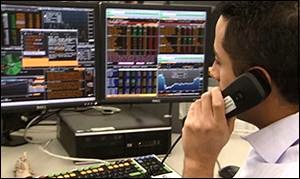By Pam Martens and Russ Martens: August 20, 2014
According to the Oxford Dictionary, the word cartel can mean either businesses that seek to restrict competition or a coalition “intended to promote a mutual interest.” Under at least the second definition, the Federal Reserve Bank of New York, a key regulator of the biggest Wall Street banks’ holding companies, has been sponsoring (yes, sponsoring) a cartel for decades.
To grasp the sheer insanity of what the New York Fed is doing, imagine going to the Securities and Exchange Commission’s web site (another Wall Street regulator) and finding that it has loaned out its web site and its imprimatur to multiple Wall Street cartels writing their own rules of conduct. It sounds Orwellian doesn’t it.
And yet this is the web site address for the New York Fed-sponsored Foreign Exchange Committee: http://www.newyorkfed.org/fxc/ which has been operating for the past 36 years and whose three key members, JPMorgan Chase, Citigroup, and Morgan Stanley, are likely to be charged this fall, according to press reports, with involvement in rigging the very foreign exchange market they are engaged in writing best practices for under sponsorship by the New York Fed.
According to the current member list at the New York Fed’s Foreign Exchange Committee’s web site, Troy Rohrbaugh of JPMorgan Chase chairs the group; Senad Prusac of Morgan Stanley is a member as is Jose Luis Yepez of Citigroup.
Not to put too fine a point on it, but JPMorgan Chase is currently on a two-year probation (deferred prosecution agreement) imposed by the U.S. Justice Department for committing two felonies in aiding and abetting the Bernie Madoff fraud over decades. Should it be involved in writing best practices for, uh…anything?
But it gets worse. The lawyers that will likely be involved in defending the Wall Street banks and or discussing settlements with the Federal Reserve over rigging the foreign exchange markets have their own sponsored wing of the New York Fed. It’s called the Financial Markets Lawyers Group and its web site, an extension of the New York Fed’s web site, is http://www.newyorkfed.org/fmlg/
Included among the current members of the Financial Markets Lawyers Group are: Lisa A. Shemie, Executive Director and Assistant General Counsel, JPMorgan Chase; Maria Douvas-Orme, Managing Director, Morgan Stanley; and Robert F. Klein, Managing Director and Counsel, Citigroup Global Markets – all firms implicated in foreign exchange market rigging.
In its first annual report for 1979, the Foreign Exchange Committee wrote:
“A year ago, the Federal Reserve Bank of New York announced that, in response to urging of bankers in the U.S. foreign exchange community, it would sponsor the establishment of a Foreign Exchange Committee…
“To some extent, this first year was one in which the Committee worked out its specific procedures and established working relationships with the other institutions that take an interest in the foreign exchange and international money markets.” [Italics have been added because under anti-trust law it is typically considered illegal to have “working relationships” with competitors involved in the same market.]
Among the charges that will likely be brought by regulators this fall is that foreign exchange traders from multiple banks had “working relationships” with competitors where they rigged markets in chat rooms or instant-message groups that they named “The Cartel” and “The Bandits Club.”
In August 1976, the Committee on Banking, Currency and Housing released a report titled: Federal Reserve Directors: A Study of Corporate and Banking Influence. The report drills down to the core of the ongoing problem today:
“The big business and banking dominance of the Federal Reserve System cited in this report can be traced, in part, to the original Federal Reserve Act, which gave member commercial banks the right to select two-thirds of the directors of each district bank. But the Board of Governors in Washington must share the responsibility for this imbalance. They appoint the so-called ‘public’ members of the boards of each district bank, appointments which have largely reflected the same narrow interests of the bank-elected members. The parochial nature of the boards affects the public interest across a wide area, ranging from monetary policy to bank regulation. These are the directors, for example, who initially select the presidents of the 12 district banks—officials who serve on the Federal Open Market Committee, determining the nation’s money supply and the level of economic activity. The selection of these public officials, with such broad and essential policymaking powers, should not be in the hands of boards of directors selected and dominated by private banking and corporate interests.”
On January 15 of this year, the New York Fed formally chartered a new cartel – the Treasury Market Practices Group. The charter reads:
“The Treasury Market Practices Group (‘TMPG’ or the ‘Group’) is a private-sector organization sponsored by the Federal Reserve Bank of New York. The TMPG is a group of market professionals committed to supporting the integrity and efficiency of the Treasury, agency debt, and agency mortgage-backed securities (MBS) markets. The TMPG is composed of senior business managers and legal and compliance professionals from a variety of institutions.”
The TMPG has been functioning for some time. Just when it came under the New York Fed’s sponsorship is unclear. Its current members include executives from JPMorgan Chase, Morgan Stanley, and Citigroup.
Related Articles:
Is the New York Fed Too Deeply Conflicted to Regulate Wall Street?
New York Fed’s Strange New Role: Big Bank Equity Analyst


